After receiving numerous letters and offers of solutions and technical expertise, I’ve decided to implement a few technical solutions rather than taking comments down completely.
Apparently, my blog without comments is a completely unacceptable scenario for most of you. This warms my heart, for it is indeed a cornerstone of this community that anyone can post and contribute to the discussion.
So this week I’ll be implementing the MT-Blacklist module, among other techniques that have been passed on to me. I’m going to document the process from beginning to end — even though doing so my help the spammers try to beat it. We’ve all got to work together and learn from each other on this one.
Talk soon…
lisa
ps. I’m still getting my act together in general this month, but the Daily Show Clips, Bill Moyers Clips, and other goodies will be up soon!
Category Archives: Spam Tech
Lou Katz, Cindy Cohn, Craig Newmark And A Ton O’ Spam Tech Vendors At The Hillside Club’s CyberSalon On Spam
Jeff Ubois and Sylvia Paull put together a CyberSalon On Spam June 15, 2003 at Berkeley’s Hillside Club. Craig and Cindy’s presentations and the discussion that follows is of particular interest.
Lou Katz On Spam (Small – 27 MB)
Craig Newmark On Spam (Small – 16 MB)
The EFF’s Cindy Cohn On Spam (Small – 16 MB)
Follow up w/Craig and Cindy (Small – 7 MB)
Spam Filter Vendor Talks:
IronPort On Spam (Small – 24 MB)
Enrique Salem, CEO of Brightmail, On Spam (Small – 20 MB)
Pavri Diwariji from MailFrontier, On Spam (Small – 9 MB)
Jordan Ritter of Cloudmark, On Spam (Small – 10 MB)
Doug McLean of Postini, On Spam (Small – 12 MB)
Lou Katz (below)
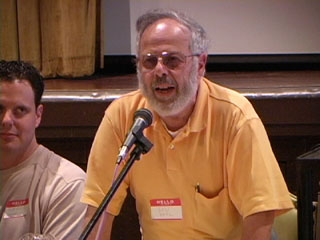
Craig Newmark (below)
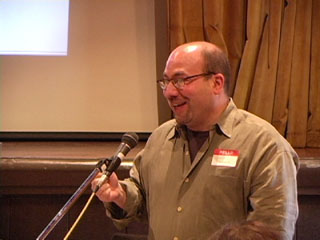
Cindy Cohn, EFF (below)
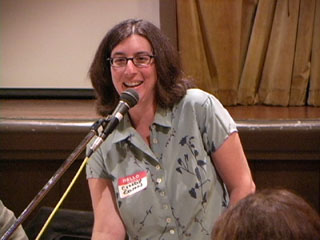
Craig Newmark, Cindy Cohn (below)
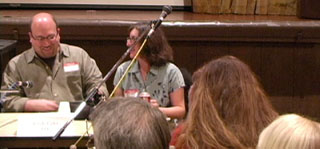
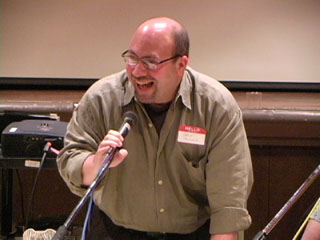
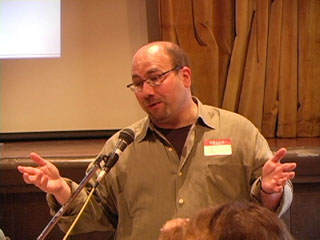
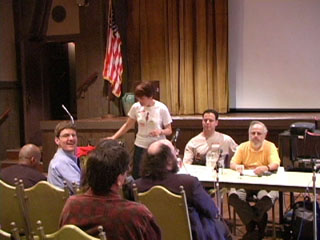
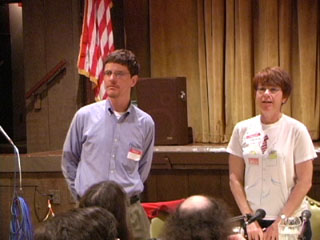
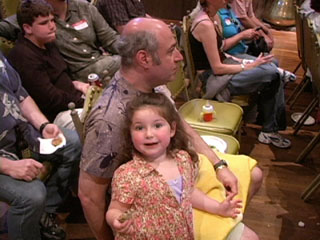
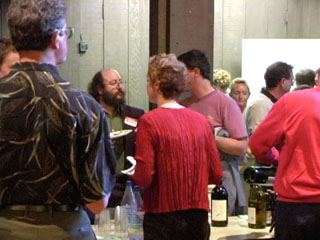
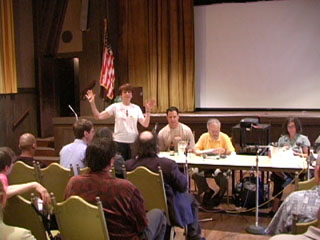
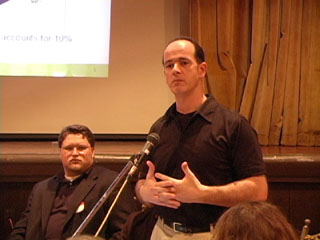
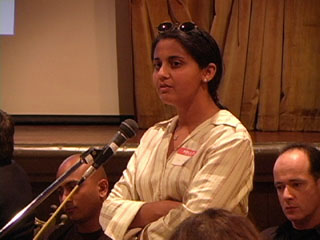
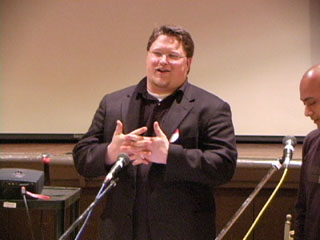
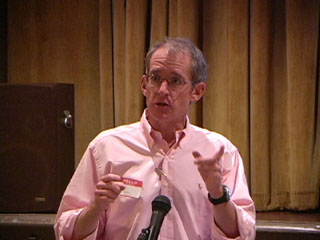
Uber-Spammers and Anti-spam Super Heroes Duke It Out In Berkeley This Sunday
There’s a cool panel I’ll be going to this Sunday in Berkeley at the Hillside Club.
I don’t mean to make the event sound confrontational in my headline. The goal of this panel is to get everybody in one room so we can hear all of the different viewpoints on these issues. Hopefully we’ll be willing to listen to one another. It should be pretty interesting.
Members of the press: this would be a good chance for you to spend an hour or so of your time and learn everything you ever wanted to know about spam tech and collect a round of business cards from the participating parties for quotes in the future when this stuff hits the mainstream media over the next few months.
CAN WE STOP SPAM?
A Panel of Spammers, Anti-Spammers, and the Spam-Inflicted Duke It Out
Here’s the official description:
We’ll hear all sides – including your own – at a revolving panel, which
includes antispam developers Brightmail, Postini, Mail Frontier,
Cloudmark, and ActiveState (from Canada); Internet entrepreneur Gary
Kremen, founder of Match.com and sex.com, who argues that spam is
ineradicable; Paul Goldman, CEO of Markado, an “intelligent” etailer;
EFF Chair Brad Templeton; Craig Newmark, founder of Craigslist; and PC
World’s Harry McCracken, whose team has just completed an exhaustive
round-up of anti-spam legislation.
What: Sylvia’s and Jeff’s CyberSalon
When: SUNDAY, June 15, 2003
Time: 5:30-8:00 p.m.
Where: Hillside Club, 2286 Cedar St. Berkeley
Directions are at the bottom of the full invite.
See you there.
Lessig On The New Anti-Spam Bill He’s Betting His Job On
This is a clip from my local San Francisco news station KTVU, from last Monday night.
(Many apologies for the late turn around – I am swamped people! Swamped!)
Lawrence Lessig is helping Congresswoman Zoe Lofgren to spread the word about the launch of her new anti-spam bill, The Reduced Spam Act of 2003.
The bill would protect a business’s right to send correspondence to its existing customer base, while providing a cash bounty to users-at-large who are the first to report spam.
More on this in the days to come — as you can see I’ve started a category to start tracking spam legislation as it inches along through the various State Legislatures.
I think this kind of legislation is very important. We need it, but we need to protect the right to send unsolicited email. (I get great unsolicited email all the time, and I probably send even more of it.)
Lofgren’s Anti-Spam Bill, KTVU – Channel 2 News 4-28-03 (Small – 6 MB)
Lofgren’s Anti-Spam Bill, KTVU – Channel 2 News 4-28-03 (Hi-Res – 97 MB)
Audio – Lofgren’s Anti-Spam Bill, KTVU – Channel 2 News 4-28-03 (MP3 – 4 MB)
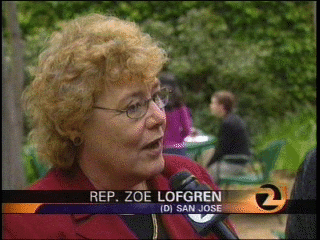
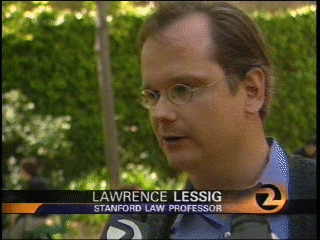
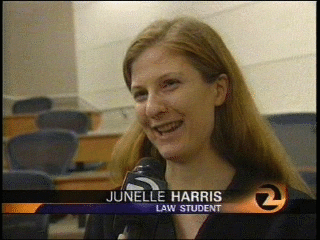
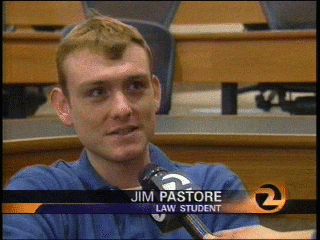
Spam Justice
Mike Wendland Interviewed bragging spam king Alan Ralsky for the Detriot Free Press. The article got Slashdotted, and then someone on the discussion list got the idea to spam back. (I can’t find the exact thread, but would love to link to it from here.)
Now the Spam King is complaining that…well…that it really sucks to be spammed.
This is a stretch on “spam tech” — more like good old fashioned grass roots organizing in action, but I think it’s interesting that Ralsky doesn’t seem to grasp the irony of the situation.
“They’ve signed me up for every advertising campaign and mailing list there is,” he told me. “These people are out of their minds. They’re harassing me.”
That they are. Gleefully. Almost 300 anti-Ralsky posts were made on the Slashdot.org Web site, where the plan was hatched after spam haters posted his address, even an aerial view of his neighborhood.
“Several tons of snail mail spam every day might just annoy him as much as his spam annoys me,” wrote one of the anti-spammers.
Ralsky is indeed annoyed. He says he’s asked Bloomfield Hills attorney Robert Harrison to sue the anti-spammers.
Useful Backgrounder On Spam Filtering Techniques
By David Mertz, Ph.D., for IBM DeveloperWorks:
Six approaches to eliminating unwanted e-mail
(Thanks, Cory.)
For purposes of my testing, I developed two collections of messages: spam and legitimate. Both collections were taken from mail I actually received in the last couple of months, but I added a significant subset of messages up to several years old to broaden the test. I cannot know exactly what will be contained in next month’s e-mails, but the past provides the best clue to what the future holds. That sounds cryptic, but all I mean is that I do not want to limit the patterns to a few words, phrases, regular expressions, etc. that might characterize the very latest e-mails but fail to generalize to the two types.
In addition to the collections of e-mail, I developed training message sets for those tools that “learn” about spam and non-spam messages. The training sets are both larger and partially disjoint from the testing collections. The testing collections consist of slightly fewer than 2000 spam messages, and about the same number of good messages. The training sets are about twice as large.
A general comment on testing is worth emphasizing. False negatives in spam filters just mean that some unwanted messages make it to your inbox. Not a good thing, but not horrible in itself. False positives are cases where legitimate messages are misidentified as spam. This can potentially be very bad, as some legitimate messages are important, even urgent, in nature, and even those that are merely conversational are ones we do not want to lose. Most filtering software allows you to save rejected messages in temporary folders pending review — but if you need to review a folder full of spam, the usefulness of the software is thereby reduced.
Using Bad Poetry To Fight Spam?
If this isn’t a sure sign of desperation, I don’t know what is.
(Also, this year’s rash of cyber-haiku is officially being taken a little too far, don’t cha think?)
See the story by Michelle Delio for Wired News:
Haiku’da Been a Spam Filter.
New Salon Story By Katharine Mieszkowski
The latest wave of spam bots have their own love-starved human
knowledge workers:
The bot who loved me.